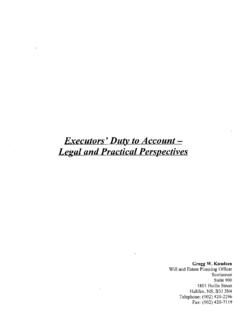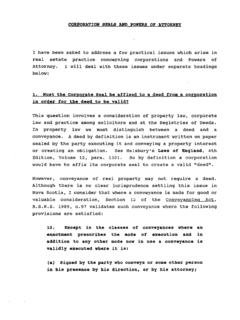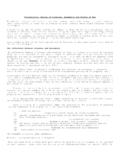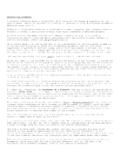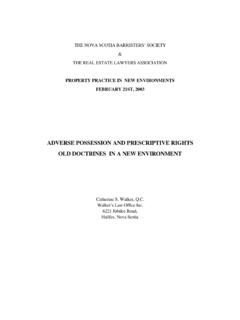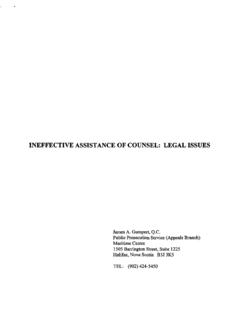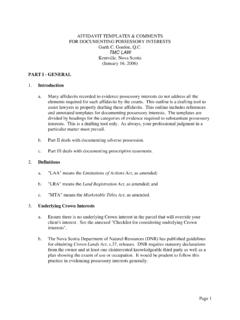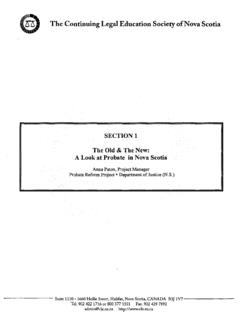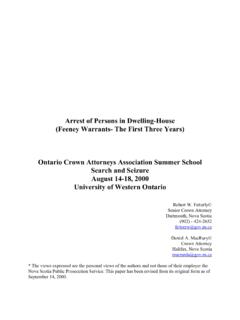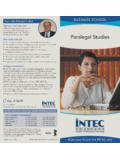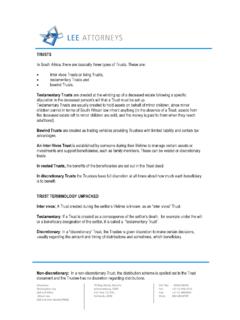Transcription of Missing Witnesses and Wills - NSBS Home
1 Missing Witnesses and WillsTo prove a will in common form, one witness normally swears an affidavit as to thedue execution of the will . Usually you will have no difficulty finding at leastone of the Witnesses and getting him or her to do , both Witnesses turn out to be dead, incapacitated or Missing . Whenthat happens, the Registrar of Probate will accept the affidavit as to the signature of the testator. The Registrarwould like to see this from a relative, close friend, business associate, bankeror some similar person who would know the testator's signature similar affidavit or affidavits as to the signature of at leastone witness (and preferably both).This policy is set out in the Probate Manual, which you should all have.
2 I believeit has been in the Bar Admission Course probate materials for years are examples of affidavits of this type which I have borrowed from thematerials from the "Practical Probate" CLE conference of April 1983. Thosematerials make an excellent reference for all sorts of probate you know both Witnesses are dead or incapacitated, you know you must followthis route, which is admittedly a second best to having a witness prove the , if the Witnesses cannot be located, the question arises as to howexhaustive a search you must make. I think it is reasonable to assume you shouldfollow up on all available leads. But I don't think it would be incumbent upon youto advertise or take other extraordinary measures to locate the Witnesses if youcan find people who know the Witnesses and can complete affidavits as to are some preventive measures you can take when supervising theexecution of a will to try to minimize the chances of having to prove a will inthis way.
3 Try to choose Witnesses who are younger than the testator. Try to choosewitnesses whose whereabouts are likely to continue to be known or at least whosesignatures are well known. The common practice of having execution in a lawyer'soffice or a trust company's office is good in this me give you an illustration of how easy it is to run into spring I had a will to prove. The will was made fifteen years ago, not anunusually long time ago. It appeared to have been signed in a trust company'soffice. One of the Witnesses was a trust officer who died some years ago. No oneat the trust company knew who the woman was who was the second witness. However,by checking with a person retired from the company, the trust company stafflearned that this woman had been a secretary at the company at the time the willwas signed but had left long ago.
4 The only lead was she was believed to be livingsomewhere in the check of the city directory for the year the will was signed showedthat this woman was married and the entry gave her husband's name. A check ofeach town in the telephone directories for the Valley showed only one personwith that name. It turned out to be the right couple. This woman was happy toprove the will by this lead had not panned out, we would have proved the will withaffidavits as to the signatures of the testator and the trust officer. I doubtif we would have been able to find someone familiar with the second witness'ssignature but that would not have been required.[Affidavit Proving will Witnesses to a will being deceased.]
5 ]PROVINCE OF NOVA SCOTIA)COUNTY OF HALIFAX)IN THE COURT OF PROBATEIN THE ESTATE OF John David Smith, DeceasedI, Edgar Jones, of Dartmouth, in the County of Halifax and Province ofNova Scotia, Barrister-in-law, make oath and I knew John David Smith late of Dartmouth inthe County of Halifax and Province of Nova Scotia, attached hereto and marked "A" is a paperwriting purporting to be the Last will and Testament of thelate JohnDavid Smith deceased, and dated the 10th day ofMarch, , the said paper witing bears a signature "JohnDavid Smith" which has been witnessed on the face thereof by"Edward Cox" and "Elaine White". I knew that the said Edward Cox and the saidElaine white both of whom are now deceased, and both of whomresided at Dartmouth, in the County of Halifax, and Provinceof Nova Scotia, prior to their respective I am familiar with the signatures of the saidEdward Cox deceased, and Elaine White deceased, and say thatfrom my knowledge of their signatures, that the signatures of "Edward Cox" and"Elaine White" on the said paper writing marked "A" are in fact the signatures ofEdward Cox deceased, and Elaine White deceased, I knew the said John David Smith, deceased,for 35 years,- prior to his death and during this period hewas of sound and disposing mind.
6 Memory and TO at Dartmouth in the)County of Halifax and)Province of Nova Scotia this)2nd day of March, , 1983,)before me, )EDGAR JONESA COMMISSIONER OF THE SUPREME)COURT OF NOVA SCOTIA)PROVINCE OF NOVA SCOTIA)IN THE COURT OF PROBATECOUNTY OF f1 ALIFAX SS )IN THE ESTATE OF JOHN DAN MacDONALD, DECEASEDAFFIDAVIT OF ANN M. ROBERTSONI, Ann M. Robertson of Dartmouth, in the County of Halifax, Province of Nova Scotia makeoath and say as I am Ann M. Robertson of Dartmouth, in theCounty ofHalifax and Province of Nova the Last will and Testament of John DanMacDonaldis produced herewith and marked "A". the "S. C. Robertson" who was one of thewitnessesof the said will is now deceased having partedthis lifeof the 10th day of September, A.
7 D., the S. C. Robertson witness as aforesaid wasmy late husband and I am familiar with his I have examined the said will of the saidLate JohnDan MacDonald dated the 5th day of Janaury, ,1950 and the signature of the witness thereto S. in fact the signature of Sydney C. Robertson,my late '1 'O at Halifax,in the)County of tialifax,Province)of Nova Scotia, this 14th)day of January, A. D., 1975)before ine : )REGISTRAR)ANN M. ROBERTSON(Affidavit used when both Witnesses to will can't be found to proveWill)PROVINCE OF NOVA SCOTIA)IN THE COURT OF PROBATECOUNTY OF HALIFAX)COUNTY OF HALIFAXI, M. It. Frank Hamilton, of Halifax, in the County of Halifax andProvince of Nova Scotia, Son of the late Edward Fairweather Hamilton;MAKE OATH AND SAY AS I am the son of the late Edward FairweatherHamilton who died at Halifax on the 26th day of September, , I am familiar with the signature of my lateFather, Edward Fairweather I have examined the will of the late EdwardFairweather Hamilton dated the 7th day of October, 1940, andthe signature thereto "E.
8 F. Hamilton", the Testatortherein, is the signature of my late Father, EdwardFairweather TO before me at Halifax,)in the County of Halifax,)Province of Nova Scotia this )day of October, )1979. )M. H. FRANK HAMILTONL ocating AssetsGetting in the assets is probably the most important job the personalrepresentative has in administering an estate. Your role in this task willdepend on the capabilities of the executor. If the executor is a trust company,it is unlikely you will be asked for any advice; most trust officers would havemore practical experience than you in locating assets. However, if the executoris an individual, your advice will be important to seeing that all the knownassets are gathered in quickly and efficiently; you will have more experiencethan most people confronted with the task of being a personal looking for assets, you will generally be guided by the deceased'sown records.
9 Most assets will leave some paper trail that you can pick up people keep this paper, although some are more organized about it thanothers. Unless your personal representative is very competent, I would recommendthat you personally sift through these papers along with the personalrepresentative. You may spot something, a cheque stub for example, that willlead you to an asset for which there is no other evidence. It is very easy tooverlook an important asset if a scrap of paper is the only are several things you should keep in mind about the nature ofassets in estates. First, remember to think of assets in the broadest sense ofthe term. Don't just look for assets which would eventually show up on aninventoryat Probate Court.
10 Often the bulk of a person's resources at death do not form partof the person's estate. Insurance policies and RRSP's may be payable directly to abeneficiary. Other assets may be jointly owned and pass by survivorship. If yousee your duty as helping the whole family, not just the personal representatives,you should be just as vigilant in trying to locate those assets as the ones whichactually come into the hands of the personal , keep in mind that very often the bulk of the assets in an estate areintangibles. The only reference to their existence is a piece of paper. Insurancepolicies, RRSP's, pensions, stocks, bonds, debentures and bank accounts all fallinto this category.
